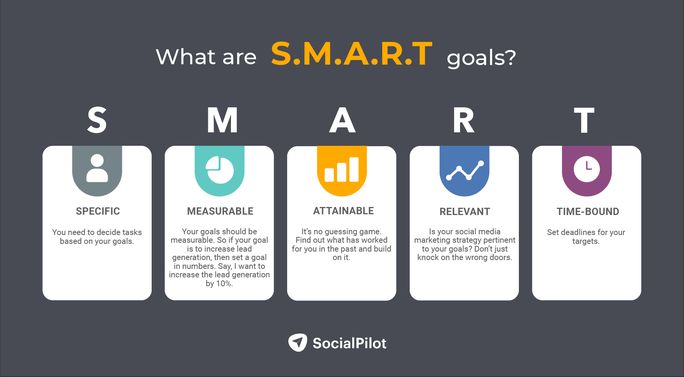Perfect, you have got your client’s attention and moved them to the consideration stage in your sales funnel.
At this stage, you need something that makes you shine brighter than the competition around you.
Something that gives your clients the final nudge they need to choose you as their social media marketing comrade.
And that something, my friend, is a fine-looking “Social media proposal.”
Whether you are a freelancer or work at a social media management agency, it’s essential to create a social media proposal to convert new prospects into clients.
However, the task is a bit tricky. So, we will cover a step-by-step process that will enable you to create your social media management proposal from scratch.
Want a more simple route? Feel free to use our fully customizable social media proposal template, ready to be filled with your proposal.
A social media proposal is a document through which you explain to your prospects how your services will help them achieve their social media goals.
It’s not a straight-up dull service pitch but a well-crafted document that comes into existence after consultation with prospects and thorough research on their needs.
In the document, you establish your expertise, elaborate on the prospect’s needs and goals, explain your services, and discuss how they will benefit the end results.
Overall, your task here is to tell prospects why you are the right fit for the job.
There’s more to it.
Once you explain all the work you will do, the details about the budget and the timeline also go into the social media management proposal.
By now, you may have understood that the client discovery session is the backbone to creating a winning social media proposal.
A discovery session is where you understand the needs of your prospects better. This session can take place over a call or through a social media questionnaire.
So make sure you ask the right questions. Here are some questions you must include in your discovery session.
Note: Discovery session also enables you to understand if your potential client’s needs and goals match with your expertise or not. If you realize that the client is not a good fit for you, it’s better to drop or connect them with someone else in your network instead of wasting time and energy.
You can open the conversation with questions that clarify your prospect’s business needs and goals.
You may ask:
What are your current business goals?
And then go on talking about, How do their business goals align with social media marketing?
Your prospects may have already tested the waters in marketing their business on social media.
So, ask about their experience.
- How was their past social media performance?
- What worked and didn’t work for them in the past?
- How are they currently using social media?
- What challenges are they facing in reaching their social media marketing goals?
2. Learn About their Target Audience
Once you get clarity about your client’s social media goals, figure out who is their target audience.

This information will help you propose the right goals and social media marketing platform to your potential client in the social media proposal.
Your aim here is to have a deep understanding of your prospect’s target audience so that you can create their marketing personas.
So ask and research the following question around your prospect’s target audience:
- What are their average age range and gender?
- What is their job profile? Income range?
- Where do they reside?
- What are their preferences, pain points, and values?
- What are their buying patterns?
- What are their goals?
Based on the information you get from your prospects and research, create a prospect’s buyer persona.
3. Talk About their Competitors
Who, according to you, are your five closest competitors?
What do you like most about your competitors?
Unless you are trying to bag a business that sells potatoes on mars, it will have competitors.
Your task is to identify the competitors your prospect has to set the benchmarks against. Understand what is working for them and what is underperforming. It will also help you in understanding the target audience of an industry that your prospect belongs to.
Start the competitor’s research once you have all the information from your prospects over the discovery session.
This step is not exactly the part of the discovery session but will help you create an effective proposal for social media marketing.
You have already picked the brain of your prospect on how they see their current social media performance. It’s time to see what they are missing out on.
So while performing a social media audit, identify:
- What platforms are they using?
- What kind of content is working for them?
- Are they running any ads?
- What’s their post frequency?
Basically, you need to know what’s working and not working for them and use that insight while crafting the social media proposal.
5. Get an Idea About their Budget and Deadlines
At last, find out how much your clients are willing to invest to achieve their social media goals.
Besides money, you also need to know their expected delivery timeline from a social media marketing agency.
So don’t hesitate, at the last hour, in asking the following questions that will help you understand their budget and timelines:
What is your social media marketing budget?
How soon would you like to start?
By what date are you expecting to achieve the goals?
This last step in the discovery session will help you get more insights into your prospect’s budget allocation and help you create an apt pricing plan to provide your social media management services.
Once passed the discovery session, you will know what your clients are looking for.
What’s next?
It’s time to craft a social media proposal that demonstrates an understanding of your prospect’s needs and how your marketing agency is the best to fulfill them.
So let’s break down the process of creating a client-winning social media proposal from scratch.
You can also start quickly with our customizable social media proposal template.
The Frontpage
Firstly, you need to create a front cover page for your social media proposal.
The Frontpage should have the report’s title alongside your client’s name and your detailed contact information at the bottom.
You can write “Social media proposal for (Client name)” and add the client logo to give a personalized feeling.
Further, add the following information about yourself:
- Your Name
- Your Company or Organization
- Phone
- Website
Introduction
In the introduction section, you give an overview of your social media proposal. It is the opening paragraph of the proposal where you mention the client’s needs to show how well you have understood their goals and concerns.
You can also add something about yourself, such as a company brief, experience, and mission statement. It will help you create a better connection with the prospect.
Two things to keep in mind while writing the introduction:
- Keep your writing tone polite
- Use words like you, yours, and we to address the prospects directly and establish a relationship
- Clearly mention the intended goals
Next, based on the discovery call, you have to align the prospect’s business goals and objectives to their social media goals.
But remember to avoid the generic description of your services that you will provide to achieve them, instead go explaining the KPIs you will aim for.
Here, you can use the S.M.A.R.T goals technique to clearly define the social media goals you will achieve for your clients.

When we say S.M.A.R.T goals, it means that every goal you decide should specify the platform(s), the metric(s), and the end date.
Say your prospect want to increase the engagement on their social media, then the SMART goal would be:
Increase the engagement rate on Facebook and Instagram by X% over the next 3 months.
Giving granular social media goals will give an impression to prospects that you have a good understanding of their business needs and have the expertise to realize them through social media.
In order to suggest a prolific social media strategy to your prospects, you will anyway audit their social media channels. So, how about you show the report to your prospect also.
A social media audit report in your proposal will give your clients an overview of how their social media channels are performing.
You can essentially talk about all the aspects which affect the current needs of your prospects. For example, if your clients want to increase engagement on social channels, then include the engagement rate on each channel.
Your client might not be able to grasp the situation as clearly as you would, so it’s better if you explain to them well the underperforming aspects of their current social media marketing.
You can divide the assessment into two parts:
- We were particularly impressed by (list out what stood out to you the most)
- However, we have noticed (a list of underperforming aspects) that are hindering your growth on social
Scope of Work
Scope of work is the most essential section of your proposal. This is where you elaborate on every service you will provide to your client.
Everything you propose here will be based on the interaction and learning you had with your prospect and social and competitive audits.
Remember to define the specific deliverable you will provide. How many posts will you be doing on Instagram? When will you share the analytics report? Make sure everything is clear and easily understandable.
Take a look at the typical tasks every social media marketing agency include in their scope of work:
Platform selection: Mention the social networks you will target and why they qualify as the optimum avenue to realize prospects’ dreams.
Content creation and curation: Outline the tasks you will perform, such as creating a social media calendar, making videos, designing images, writing captions, and curating niche-related content.
Posting schedule: State how often you will be posting on a particular social media handle and its effect on the overall strategy. If approval is needed from clients, then explain the framework.
Brand keyword monitoring: Mention the brand hashtags and keywords you will be monitoring and how often you plan to respond to them.
Engagement and community building: Mention how often you will be engaging with the audience.
Review meetings: Highlight how often you will catch up with the prospect to review the performance and discuss opinions and ideas.
Analytics and reporting: Discuss how often you will be sending the analytics reports and what you will be tracking.
Report sharing is not a one-time thing. Some marketers do it every week, and some do it every month. So, we removed the manual task of sharing reports from the workflow with SocialPilot ‘s Schedule Report feature.
With a click of a button, automate weekly or monthly sharing of your ready-made analytics report with clients and teammates via email. Say goodbye to the turmoil of generating social media reports manually every month.
Looking to simplify these tasks? Check out our comprehensive guide on social media templates for marketing strategy packed with ready-to-use templates and tips to make your planning and execution seamless and professional.
Proof of Work
Your prospects know that you have done some research and have knowledge about social media management.
But one thing that would impact their decision of choosing you more than anything is proof of work.
You showcase your experience and achievements using client testimonials and case studies in the proof of work section. The aim here is to share with your prospects the accounts you have managed before and the results you brought them based on their goals.
It’s better to showcase the examples of clients whose objectives and needs are closely matched to your current prospect.
Terms of Agreement
This is where you lay out your pricing structure, discuss payment terms and explain the agreement nature of collaboration.
Pricing structure: Explain your pricing model. Break down the pricing based on services promised in the scope of work. Considering the client’s needs and volume of work you can either charge on an hourly, project, or monthly retainer model.
Billing practices: Discuss the invoice process and your payment terms. You can use an Invoice generator tool like Refrens.
Termination process: Specify the project termination process if either party realizes the collaboration is not working.
The Next Step for the Client
In the final section of your social media proposal, you guide the client with the next steps they have to take after accepting or reading the proposal.
This includes:
- Ask for revisions or agree on the proposal
- Request for agreement
- Submit an initial payment
Note: Always proofread your proposal before submitting it. Having typos and grammatical errors on your proposal can really make a bad first impression.
Conclusion
Creating an effective social media proposal is an imperative part of winning more clients and growing your agency.
Every social media manager should know how to create a proposal that gives enough information and inspiration a prospect needs to convert.
Remember everything starts with the discovery session, so be attentive and gather as much information as you can.
With the detailed steps mentioned above, you will be able to create your own social media proposal template.
Or,
You can use our free social media proposal template ready to be filled with details to make your life easier.
Speaking of easy, don’t hesitate to use SocialPIlot’s unparalleled scheduling, analytics, team, and client management functionalities to automate social media marketing for your clients.
Experience it yourself. To know more, schedule a demo now!




